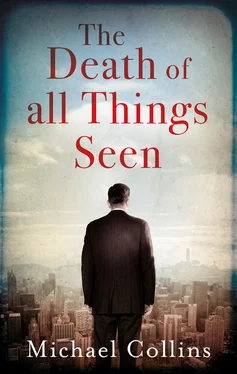Before he shipped out, she gave his father a picture of her taken on a tobacco plantation, her hands on her hips in riding jodhpurs that accentuated thighs that had held him in a gallop of a lust experienced just twice before his deployment because he felt compelled to know what awaited his return.
He kept her image against the shrapnel of Dear Johns, those letters that found their way into the Pacific before the assault on unnamed beaches, responses written within the hull of a ship, or a bunker, letters reaching home long after events had passed and, in many instances, taken the lives of those who had penned them.
Shelby Pettigrew was pregnant. She had informed his father soon after he shipped out. She lost the child eventually, but it made a great difference to his father’s survival.
Across the great distance that separated them, it was enough to know she loved him, but, regrettably, in reconvening in a time of peace, when there was less at stake, what they could not bear to lose — at one point, one another — seemed less important, less necessary to their mutual survival.
*
Nate looked up in the stream of light from the world emerging beyond. Day had broken into dense clouds threatening snow. He pinched at tiredness between his eyes, the day not yet begun, and there was so much yet to accomplish.
Nate drank again. He felt the burn in his throat. Drinking was ill advised in his condition. He caught up again with the story for Ursula’s sake. There was a part left out, the intervening years of his parents’ life. It was not explained fully. He had the story in his head.
Ursula said it didn’t matter, though it mattered greatly to Nate. He was agitated.
The barman came over and asked if Nate was okay. He was apparently talking aloud. He apologized. It mattered little. There was nobody in the bar, yet Nate set his drink away as a measure of contrition. He announced that he had arrived in from Canada.
The barman stared at him, vacant as a spoon, then left.
Nate was then suddenly quiet. He felt Ursula awaiting him in the way she must have navigated the petulance of Frank Grey Eyes.
Nate closed his eyes to catch up with the story, at the point where it had gone wrong.
There was the cofounding influence from the very beginning of Harper Delacroix, the Southern gentleman Shelby had dined with the night she had met Nate’s father. Delacroix had harbored designs on Shelby that had always lurked in the shadowy murk of a sexual longing that most probably could never have been quite fulfilled. Delacroix was portly and dandified and twenty years beyond Shelby’s age, and yet he confused the hell out of Nate’s father.
Delacroix became a perennial presence at the house, or he arrived to take Shelby to tea at a club in the city. He was known simply as ‘Dear Cousin’, his stout figure centered over the knob of a cane. He carried a pocket watch. He maintained an interest in the Kentucky Derby. He advised Shelby on what hats and dresses to wear. He had certain affectations and standards when it came to women. He was not beyond reminding her of the innate beauty of her shape.
He used his cane to poke her calves and mid-thigh, lifting her hemline with a sanctioned impropriety because he had an eye for style and he paid for everything. He plied her with sherry and other aperitifs served in small crystal glasses, so she gained a measure of how a day of ease might have been so enjoyed before the shifting influence of change and a spurious democracy. They were decided between them that they were living in terrible times.
The truth was that if Delacroix had been anything but what he was, maybe Nate’s father could have intervened. Nate’s father stayed at the golf club, recused from any definitive judgment. Shelby was lost to him anyways, with or without Delacroix.
This entrenchment of Delacroix in their lives continued and with greater frequency during the legal suits against the tobacco industry. There were by then, hearings at the state level, and then eventually at the Supreme Court. Delacroix’s practice was center stage in the Southern defense, and, though it was a losing proposition to be on the side of tobacco, it paid handsomely nonetheless. It mattered little which side you were on when you were at the top. There was money to go round for all involved.
Delacroix represented not so much a legal presence, as a fast-disappearing world of genteel manners. He puffed a redolent, sweet tobacco, so the scent of his presence lingered long after he was gone. He took Shelby to Washington DC for a series of congressional hearings, maintained decorum by calling her ‘Dear Cousin’ to the great interest of hotel and congressional staff alike. Shelby took a five-minute egg, wholegrain toast, orange juice and black coffee. The waiters knew her by name. Theirs was a life in great ruin, yet between them, they maintained the allure of something grand and dignified.
Nate’s father suffered the indignity. Shelby had all but left him. They had separate bedrooms, separate lives. He had been the future once, young and handsome, then, suddenly a silver-haired alcoholic with a great mistrust of everything he had once held close.
He had money. That was never the issue. It was just that he didn’t spend it with the lavish excess Delacroix spent it. It took a special talent, when, to Nate’s father, much of what was purchased was unessential. That was it, eventually, a profoundly different worldview, no better, no worse.
*
Nate ended with the impartiality that nothing could ever be charged against another, and that there were ways of seeing around all sides of a life in the equanimity of how Ursula would have seen it. She influenced him still.
He might have had another drink in advance of going to the offices of Weatherly, Sutherland, and Saunders to steel his nerves. There was time yet, but he thought better of it. The barman was not a friend.
Instead, Nate checked his phone to see if Norman Price had responded. He hadn’t.
It left Nate undecided what he should do. He felt a diffuse hurt in the subtle rejection of such a benign and considered request to meet. Surely, Norman Price could have politely excused himself with a prior engagement, anything but simply not answering.
Nate was resolved to try again when the pain in his side made him brace and set his hand against the table.
Before leaving The Drake, he crafted a brief, non-committal email, more a courtesy note without the suggestion of any intentionality or favor begging, a note not dissimilar to how one might have in days gone by sent a telex: Arrived safely at The Drake. Taking Dinner at 8 — NF.
NORMAN WAS COMMITTING a great infidelity in his heart. He was downtown in the Loop and hadn’t yet called Joanne. He was considering calling Kenneth. He had the pretext that he had learned what the police believed had happened to Einhorn. He would like to apologize. He had in his head an opening of quiet contrition. Enough time had passed that they might talk civilly. He deeply regretted how it had ended between them.
Norman checked his email from an Internet café. He figured that maybe Joanne had emailed by now in a general alarm over what had happened to him. She hadn’t. But Nate Feldman had.
Norman read in the single line the overture of Nate’s persistence, asking and not asking Norman to dinner in that subtle, condescending smarm that was so patently Feldman. Norman decided that at times the only way to compete with prose like that was to not respond. Silence spoke volumes to anything he might have written.
Nate Feldman would be back in Canada soon and that would be the end of it.
While Norman was deciding what not to write to Nate Feldman, an email arrived from someone called Thomas Strait. He identified himself as a concerned friend of Kenneth Caudill, and went on to explain that Kenneth had been interviewed in connection with his allegedly attempting to blackmail Daniel Einhorn, but that everything was being handled. The email had the peculiar feel of an intercept to keep Norman from contacting Kenneth.
Читать дальше












